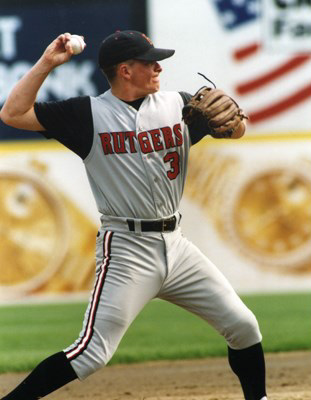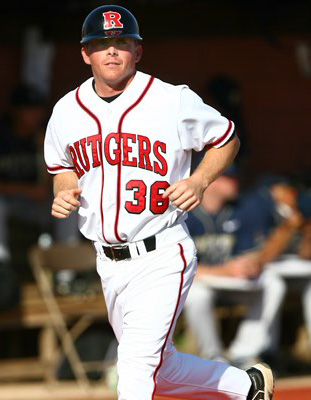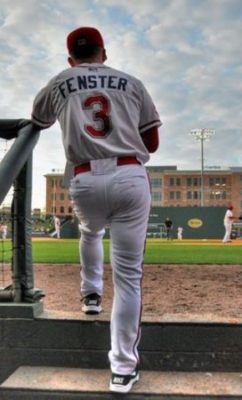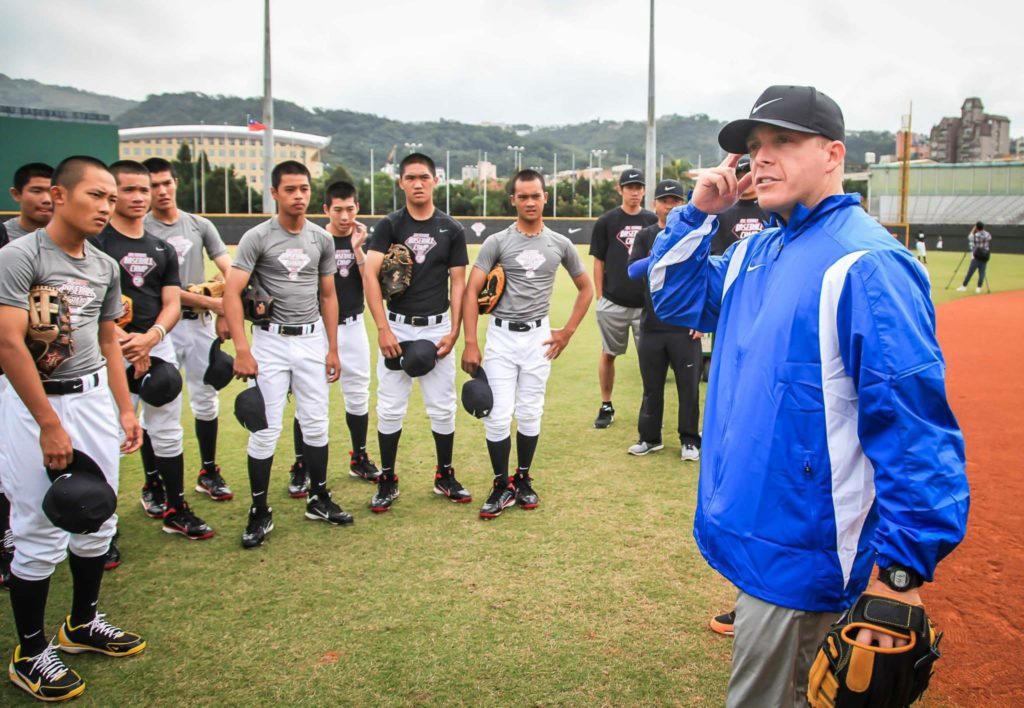By Darren Fenster
Somewhere in an old email account’s inbox of mine lies an unread message, from me, to me.
It was my life plan. Actually, it was my life plan, in baseball.
I don’t even know if AOL mail still exists here in 2018, nor could I even venture a guess to the password to recover that crystal ball email to myself if it did.
While I don’t remember the specific details of this note, I DO know that I wrote it in part motivationally, hoping to create my own self-fulfilling prophecy for me to break out years down the road and be able to tell people, “Look…I knew this was going to happen 15 years ago!”
Little did I know, nor could I hear God laughing at me back in the early 2000’s as I was writing my own predestined story. Among other things, I first described my role in helping the Royals win their first World Series title since 1985 before striking it rich in free agency to finish my career coming home to play for the Yankees.
I was not a part of the 2015 championship run in Kansas City.
I never had the chance to wear the pinstripes.
But I DO have a World Series ring with my name on it…as a part of the Boston Red Sox.

Now THAT, I promise you, wasn’t in that email to myself! Funny how life works itself out, right?
Growing up we all have dreams. As we get older, those dreams, for a lucky few like myself, become legitimate, attainable goals. But then when those dreams and those goals all come crashing down with one swift jump for a ball over your head, that life plan entirely goes to shit, and we have no idea what to do with the rest of our days.
I’m here to tell you that’s ok. My journey in the game is evidence of a cliché that I used to hate; everything truly does happen for a reason. I tried to write my own book before I had the chance to live my own story, and while I may have gotten half-way done with it, the wrench of happenstance set me on a new course that I never once envisioned for myself, and one that I now honestly couldn’t be more fortunate to be trekking down.
To appreciate where I sit today, you have to understand where I came from, yesterday.
My story began in Middletown, New Jersey; a suburban America town along the Jersey Shore located an hour from New York City and about an hour and change from Philadelphia. My love affair with the game started in the driveway with the famed big red bat that every toddler once swung, later moving to our backyard where catch was commonplace and where ‘friendly’ games amongst family always ended with either one of my brothers or I storming inside after a bad call from the umpire, who we also referred to as dad.
Big Al Fenster was my first coach, and in many respects, my best coach. He introduced my brothers and I to the game, simply by signing us up for Little League and volunteering to skipper our teams. He took us to our first Major League games when we were young, even daring so much to take the entire family to the old Vet for a Phillies game…on Mother’s Day. My mom, Susan, got a rose out of the deal when she walked through the turnstiles, so all was not lost on such a sacred holiday.
Dad helped us learn the fundamentals of the game. He taught us how to do things the right way. He made baseball fun for us, whether it be on a field or in our backyard. He showed us what good teamwork was and what it meant to be a good teammate. And mom was always there cheering us on for support. It’s clear now: they were teaching us life through baseball.
Very quickly, at a very early age, like most other kids dreaming of playing under the bright lights of the Big Leagues, I wanted to be a Major League Baseball Player when I grew up. But unlike most kids, who come back to reality at some point usually well before they even get on to the bigger diamond, my dreams stayed strong. By the time I got to middle school, I had spoken so frequently about becoming a Big Leaguer that many signed my yearbook asking for tickets for when I became a famous player.
By the time high school began, my road map had set its course with three basic steps to stardom:
- Go to college on scholarship somewhere down south where I could enjoy nice weather and big-time college baseball. Education didn’t matter, since I wasn’t going to need a degree to be a Major Leaguer.
- Get drafted and sign a professional contract with a huge bonus after my junior year, as was the norm for top prospects, which I assured myself I was going to be.
- Progress quickly through the minor leagues en-route to becoming a household name.
Well… with hindsight 20-20, I should have learned my lesson long ago to not write my own story:
- I attended cold-weather Rutgers, initially committing to go there as a walk-on.
- I got drafted following my senior year and signed for a bonus so small that it couldn’t even pay for the tires on the dream car I had previously picked out for myself.
- I enjoyed A-ball so much that I decided to spent parts of four seasons at that level, essentially becoming a household name in the Carolina League instead of the American League.
Having spent the good part of the past 12+ years as both a college coach and professional manager where the ability to evaluate is vital in the industry, it is clear now how the undersized, under-strengthed, and under-talented five-foot, 150-pound teenage version of myself wasn’t as desired commodity in recruiting and scouting circles. After garnering minimal interest from big-time southern schools, I decided to commit to Rutgers University as a walk-on, almost entirely because it was close enough to home where my folks could see me play. The opportunity to play for a future ABCA Hall-of-Famer bared little significance in my decision of where to go to college.
Upon arriving in Piscataway in September of 1996, my life-changing relationship with then Rutgers head coach Fred Hill would take shape. In addition to teaching me how to play the game correctly, developing from a good-field, no hit shortstop into a complete all-around player, he more impressively took me in as an immature boy, and sent me off with degree in hand as a not-as-immature man, spending four years to teach me life, through the game. Aside from my parents, no one has had a greater impact on my life than Fred Hill. That kind of personal impact that went far beyond that of just a coach is exactly why I am a coach today.
As it would turn out, not getting the opportunity to play at a big-time, southern program wound up being one of the best things that ever happened to me.

In the spring of 1999, as a junior at Rutgers, my swan song was all set. The plan was to have a great season, and head off to professional baseball that June. After hitting over .400 while playing solid defense at short, in my mind it was a matter of when, not if, I was going to get drafted. Well the draft came and went, 1,474 names were called and not one of them was mine. At the time, I felt like I had done all I could do to get picked up, and it didn’t happen. While I was having a pity party for myself, Coach Hill never felt sorry for me and offered excitement at the prospect of me coming back for my senior season. My dreams for a moment were shattered, and he was excited. The nerve of him to look forward to future opportunity, rather than look back on past pain.
Well, as it would turn out, not getting drafted as a junior was one of the best things that ever happened to me. In 2000, I surpassed the previous season in just about every respect, and was given some of my greatest life memories during that year both on and off the field where I grew so much as a player, a person, a teammate, and a leader to others. That June, the Royals made my dream a reality when they selected me in the 12th round of the amateur draft. My road to Major League stardom survived just a little detour along the way.
After hitting over .400 during my last two years at Rutgers, I figured the transition into professional baseball would be a seamless one. Who knew that there would be a marked difference between swinging a wood bat and an aluminum, to the tune of about 200 points as I struggled to get out of A-ball for my first three years as a pro. The 2004 season was a I figured some things out with the bat, becoming an everyday utility player, while advancing to AA and hitting over .300 for the year. That season was such a success that it earned me an invite to Major League spring training the following year, the childhood dream now well within reach.
With a week left in Big League camp, on March 23, 2005, in the 9th inning of a tie game against the Mariners in Peoria, Arizona, I jumped for a chopper over my head as I had done seemingly a million times. Upon landing, my right knee went one way, my leg, the other. A torn ACL, tibial plateau fracture, a significant cartilage damage ended my season before it began. Devasting, to say the least, but just another bump in the road. Or so I thought. I would spend the entire year living in Arizona, rehabbing my knee back to good health, fully prepared to make my mark the following season. Well, on the second to last day of spring training in 2006, I was given my release. My playing career was over. Just. Like. That.
Completely blindsided, I didn’t have any idea as to what I wanted to do with the rest of my life. Upon returning back home to New Jersey, Coach Hill asked me if I had any interest in coaching. I didn’t have any interest in anything at that point. He felt like I would make a good coach, and if I were interested, he would create the Director of Baseball Operations position specific for me. Coach Hill saw something in me well before I was even ready to see it in myself. Thanks in large part to a group of players at Rutgers who made me feel like I could have an impact on them in the same manner that so many had an impact on me, I took to the profession incredibly quickly.

I had a second life in the game. And the rest, as they say, is history.
As it would turn out, suffering a career-ending injury was one of the best things to ever happen to me.
After spending six years on the staff at Rutgers, I had gotten the itch to get back on the pro side of the game, as my experience as a coach and recruiter set me up well to get in with a Major League organization.
Seven years later, I could not be happier or prouder to be a part of the Boston Red Sox, a club full of like-minded, passionate baseball people who love the game and thrive of getting those in it, better. Never have I felt more valued professionally; never have my days had more purpose, personally.

One of the luxuries of working in Player Development is the flexibility that the off-seasons offer. With essentially five months from my “real” job, I have been afforded countless opportunities to help grow our game through my own personal initiative, affectionately named Coaching Your Kids, helping players literally all over the world with baseball specifics on the field, while educating coaches and organizations of the diamond as a whole on things like culture, leadership, and teamwork. I genuinely treasure the opportunity to use my platform beyond the field.

It’s ok to have hopes and dreams for your life. It’s good to have a plan. In fact, I believe it is necessary to live our days with SOME sense of direction, with SOME kind of purpose towards SOMETHING. But more times than not, life will throw you a nasty curveball that you can’t hit. If you don’t touch it, don’t worry. When your goals don’t work out, don’t keep your head down. That unhittable curveball might just ultimately be the most important pitch ever thrown your way; a pitch that may just force you to learn how to hit something else way out of the park.
As it would turn out, thanks to a handful of events that I was not thankful for at the time, I am right where I am supposed to me.
Some of my greatest memories, some of my proudest accomplishments are a direct result of some of my most painful experiences and disappointing letdowns. I didn’t get to the Big Leagues. And everything turned out ok. It will for you, too.
Darren completed the 2018 season as the manager of the Portland Sea Dogs, AA affiliate of the Boston Red Sox.
He is also the Founder and CEO of Coaching Your Kids, LLC. You can follow the organization @CoachYourKids or contact via email at CoachingYourKids@gmail.com.
To connect with Darren on LinkedIn, click here.





I was a decent ball player up through HS but never played at the collegiate level. Between baseball and then softball I played for a total of 33 years, retired from playing, and then started coaching my kids. I have coached Youth sports for the last 10 years, including both girls softball and boys baseball. I love it and, although it took time to get good at it, and at the risk of sounding braggadocious, I am great at it. Last year, my girls went undefeated (came from behind in our last 7 games) and won the Championship. This year, my boys finished in first, rolled through the playoffs but came up short in the Championship. Since I have been 6 years old, I have either played or coached baseball/softball every year of my life. I was wondering if you had any advice for someone like me (never played professionally) who is considering switching careers (digital advertising executive) to pursue a career (make a living) in coaching. Thank you!